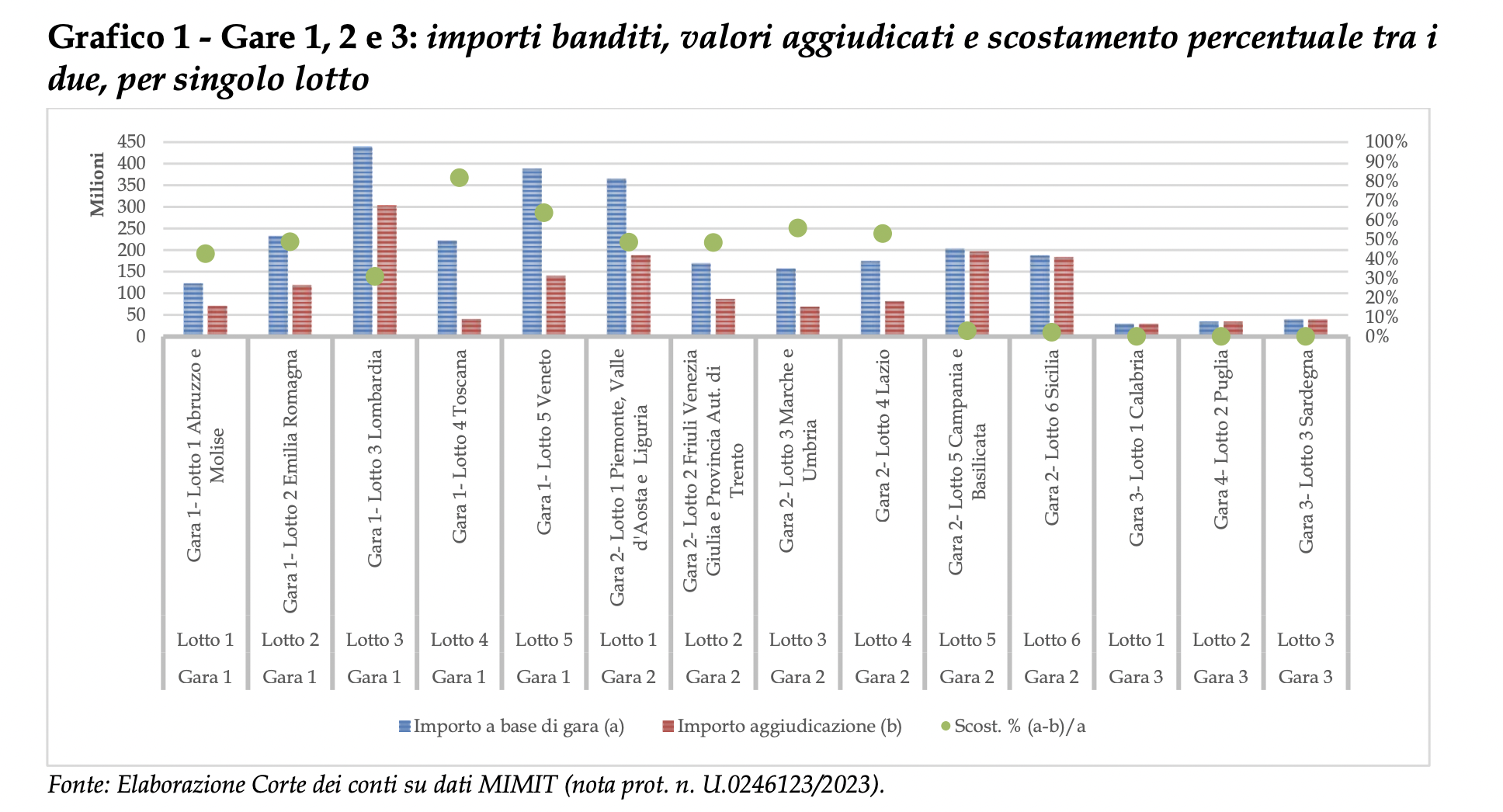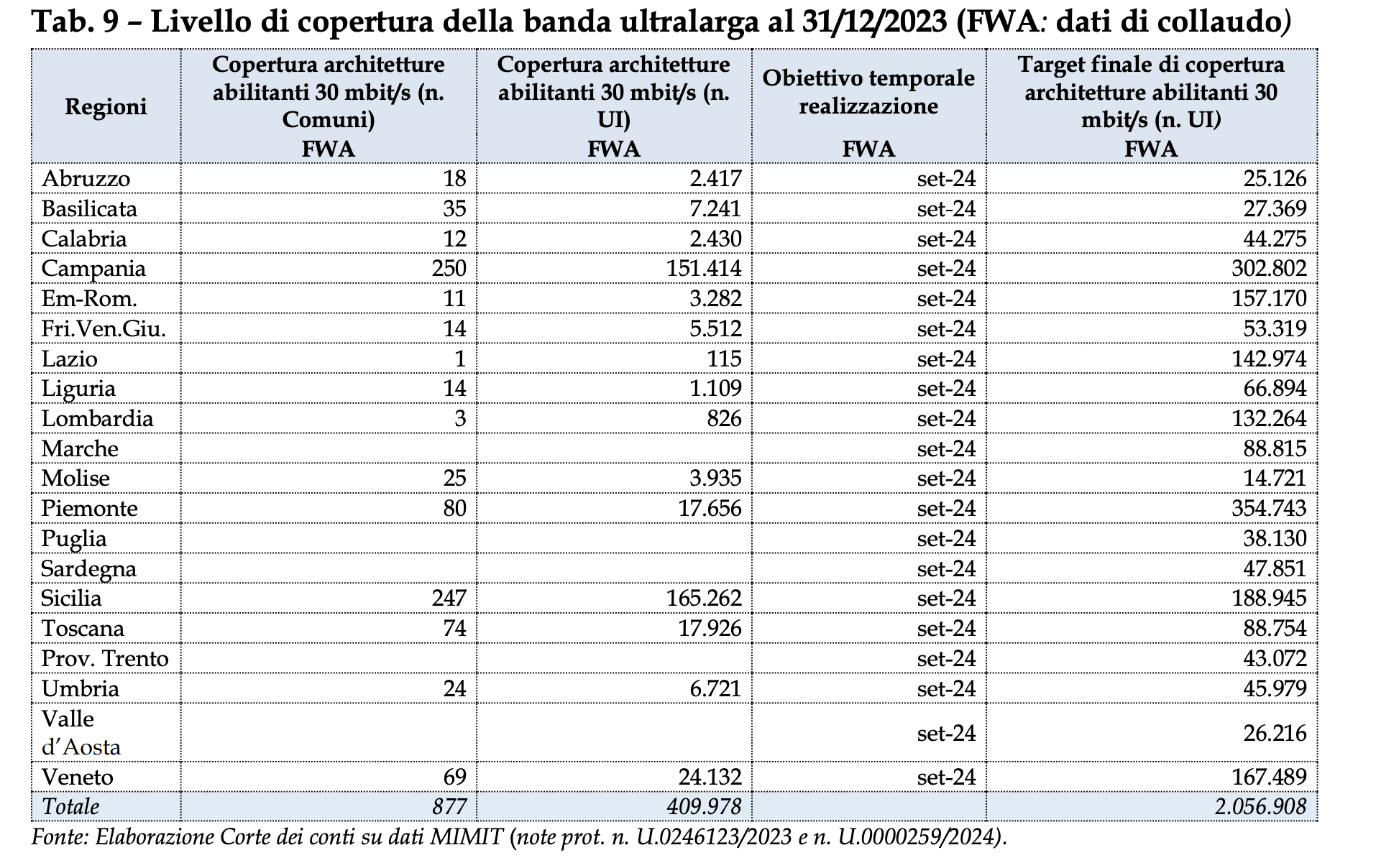Broadband, all the flaws of Open Fiber and Infratel

Here are the criticisms of Open Fiber and Infratel that emerge from the Court of Auditors' report on the Ultra-Broadband Plan
The Court of Auditors attacks delays in broadband in white areas.
“The delay recorded in the creation of the digital infrastructures linked to the Ultra-Broadband Plan – White Areas for the connectivity of approximately 8.4 million homes in Italy is significant, with an extension of the average times of the procedural phases and a shift forward in the concrete implementation compared to to the original deadlines". This is what the Concurrent Control Board of the Court of Auditors found in the analysis, approved with Resolution no. 4/2024/CCC , on the progress of the Ultra-Broadband Plan relating to the so-called White Areas, defined as "market failure" due to the absence of private investments.
As the accounting judiciary reminds us, the implementer of the plan is Infratel Italia (the state company responsible for drawing up the tender notices) and the concessionaire is Open Fiber.
“According to the data as of 31 December 2023, i.e. less than a year from the expected completion date of the Plan (September 2024), all the planning steps have not yet been completed, neither definitive nor executive” complains the Court of Auditors.
All the details.
WHAT IS THE BUL PLAN
The white areas plan is the public plan, part of the national strategy for ultra-broadband, with the aim of covering the so-called "market failure" areas, i.e. the areas where operators do not plan to bring ultra-broadband to at least 30 Mbps.
The Bul plan is placed under the control of Mimit and financed mainly with the European structural funds ERDF and EAFRD, as well as with the national FSC fund, recalls the Court of Auditors.
Therefore, the strategic monitoring activities of the Plan are the responsibility of the Interministerial Committee for the Digital Transition (CITD), which is assigned tasks of coordination and monitoring of the implementation of the initiatives relating to the BUL Strategy.
If the supervisory activity on the project is the responsibility of Infratel, delegated by the Ministry of Business and Made in Italy, "it is reiterated that the assignment of functions does not strip Mimit of any competence, but requires a diligent verification of the correct and timely exercise of the same" points out the Court of Auditors.
THE TENDERS ALL AWARDED BY OPEN FIBER
In the resolution, the Court of Auditors first reconstructed the tender for the Bul plan.
Infratel, as the implementing body, announced, first in 2016, tender procedures 1 and 2 for the concession of the definitive and executive design, implementation and functional and economic management of the Plan.
Each of the aforementioned tenders included multiple lots, corresponding to one or more Regions/Autonomous Provinces; subsequently, in 2017, the third tender was launched, for the regions of Calabria (lot 1), Puglia (lot 2) and Sardinia (lot 3). Following the public tender procedures, Open Fiber was awarded all the lots comprising Tenders 1, 2 and 3 (see graph 1).
The overall award amount was equal to 1.6 billion, compared to a total value put up for tender of 2.8 billion, with a reduction of 43%. The overall saving is equal to 1.2 billion and is linked in particular to lots 4 "Tuscany" and 5 "Veneto" of Tender 1, the accounting judiciary continues.

THE OBJECTIVES
Therefore the Plan affects 7,413 Italian municipalities, with the coverage of approximately 6.3 million real estate units with Fiber To The Home (FTTH) technology, 2.1 million with Fixed Wireless Access (FWA) technology and 29,895 between PA offices and industrial areas .
In fact, the Bul plan also includes the use of Fwa technology in addition to fiber for the coverage of white areas by Open Fiber. This “should have been completed in June 2020 for race 1, in November 2020 for race 2 and in April 2022 for race 3.”
But it didn't happen that way.
WHAT HAPPENED BETWEEN OPEN FIBER AND INFRATEL
As highlighted by Mimit during the preliminary investigation, Open Fiber "over the years, has repeatedly notified Infratel of the new implementation plans which have gradually seen the completion date of the project postponed over time, until reaching the last planning provided in January 2023 which provides for the completion of the BUL plan in September 2024" reports the Court of Auditors.
Therefore, in addition to accumulating delays, Open Fiber did not even receive extensions from Infratel.
“These temporal replannings, deriving exclusively from the delays accumulated by Open Fiber both in the design and construction phases, were never approved by Infratel, therefore no contractual extensions with respect to the expected deadlines were ever granted” (protocol note. n. U.0246123/2023)", we read again in the resolution of the accounting judiciary.
SLIPPING IN THE TIMETABLE
Looking specifically at the delays in the plan, "the time dilation suffered by the definitive design phase for tenders 1 and 2 is particularly significant, which exceeded the initially estimated time by more than 9 times; the delays for this phase are less significant compared to tender 3, with an extension of 33% compared to expectations" explains the Court of Auditors.
“The implementation delays – continues the accounting judiciary – emerge clearly both by looking at the average times of the procedural phases that mark the realization of the works (all characterized by a notable expansion compared to the estimates of the initial timetable) and by directing attention to the data on the physical progress: according to the evidence as of 31 December 2023, i.e. less than a year from the expected completion date of the Plan, all the design steps have not yet been completed, neither definitive nor executive".
ACCUMULATED DELAYS
Therefore, at the end of 2023 – highlights the Court – approximately 3.4 million homes were covered in FTTH (54% of the final target) and 18,616 PA offices and industrial areas (62%), as well as 437,000 real estate units in the construction phase testing (7%) and more than 2.2 million in the manufacturing phase (36%). The data emerging on FWA network investments is less positive and – explain the accounting judges – must be interpreted with caution due to the type of FWA architecture.
FOR SOME REGIONS ALMOST NO PROGRESS IN COVERAGE IN FWA MODE
As highlighted in Table 9, many regional entities present substantially zero progress rates regarding the level of broadband coverage with FWA. “In this regard, it should be considered how the progress data relating to the technology in question takes into account some implementation peculiarities which lead to an underestimation” highlights the Court of Auditors.

THE PENALTY APPLIED SO FAR
And Open Fiber is holding its wallet out for the penalties associated with these delays, currently around 3.4% of the amount awarded for the concession.
The Court of Auditors also recalls that the "delays recorded so far have been governed by resorting to the institution of penalties which, at the end of 2023, have been applied for a total amount of 54.6 million euros. A figure for which – underlines the accounting judiciary – emerges, on some lots, the reduction of the margins to resort to further initiatives, also by virtue of the current contractual structure”.
THE CRITICAL ISSUES THAT EMERGED DURING THE INVESTIGATION PHASE
In light of all this, "during the development period of the Plan, according to what emerged during the preliminary investigation, some critical issues were found which slowed down its execution" notes the Court of Auditors. That is, the impact of the increase in raw material prices and the shortage of specialized labor.
LABOR QUESTION
“In the Plan under examination, this problem – as emerged during the preliminary investigation – began to appear, especially in some regions, coinciding with the start of the infrastructure project in the black areas of Fibercop; this situation, according to what was reported by Mimit, has worsened with the launch of the Pnrr projects, as the quantity of work required from companies in the sector is significantly higher than their historical capacity" continues the accounting judiciary.
More in detail, Mimit represented that "the limited duration of public investments (limited by the expiry of the Pnrr funds) discourages investments by companies that have the doubt of not seeing any investments in resources and means of work rewarded over time . Furthermore, investing in new resources, other than those already trained and present in the TLC market, is particularly complicated because it requires a training period of at least 3 months, the costs of which are unlikely to be recovered by the companies.
“ANIE Sit, the Association of TLC network system integrators which brings together the main companies in the sector and currently employs around 35,000 people, estimates that a further 15,000 are needed. An attempt has been made to provide an answer to the problem by including the TLC sector in the flow decree but, at the moment, with very little results. In fact, in addition to the necessary technical training period, in this case it is necessary to add a period of basic linguistic training which slows down even further the operational entry into the labor market of these new resources" (so, note prot. n. U. 0246123/2023)” still reports the accounting judiciary.
THE COURT'S RECOMMENDATIONS TO MIMIT
This is why "the implementation of the Plan by September 2024 will require the use of significant workforces", urges the Court of Auditors.
“The shortage of specialized manpower, if not promptly managed, could undermine the achievement of the final target. The Board therefore draws attention to the importance of launching every initiative necessary to address this problem, also coordinating with other competent national or territorial authorities" puts the accounting judiciary in black and white.
Finally, "in the event of a misalignment – recommends the Court of Auditors to Mimit – between the actual progress of the works and the final deadline of the Plan (September 2024), the necessary corrective interventions will have to be defined also in terms of the shortage of specialized manpower and a new timetable that guarantees the completion of the works quickly, with tight control over compliance with the new deadlines by all those involved". With a clear reference therefore to Infratel on one side and Open Fiber on the other.
This is a machine translation from Italian language of a post published on Start Magazine at the URL https://www.startmag.it/innovazione/banda-larga-tutte-le-pecche-di-open-fiber-e-infratel/ on Mon, 18 Mar 2024 11:27:59 +0000.
